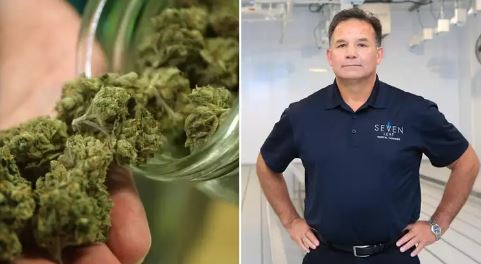You are here
Home 🌿 Medical Cannabis News 🌿 Meet the former cop behind Canada’s first indigenous licensed cannabis producer 🌿Meet the former cop behind Canada’s first indigenous licensed cannabis producer

Eighty years ago, the police chief on the Caughnawaga reserve across the St. Lawrence river from Montreal spent weeks supervising the picking, carting, and burning of 3,500 pounds of pot under order of the Department of Indian Affairs. “The leaves and seeds of the marijuana plant contain a drug police fear more than any other narcotic,” ominously warned the Montreal Gazette on September 29, 1938, adding cops considered it a “greater menace” than opium and cocaine because it “often brings on insanity.”
This reefer believed to cause madness had reportedly been growing wild across the land now known as Kahnawake Mohawk Territory for “as long as residents can remember,” the Gazette wrote.
Fast forward to September 21, 2018—and a hundred klicks downriver to Cornwall Island in Akwesasne Mohawk Territory—and former police chief Lewis Mitchell was getting a far more preferable directive from the feds. After a four-year application process, his company Seven Leaf, had finally been given the go-ahead to cultivate cannabis. And Mitchell became president of Canada’s first Indigenous owned-and-operated licensed producer (LP).
“We're pretty proud of that,” Mitchell told VICE. “To be the first is huge--and we’re looking to inspire not only our own community members, but hopefully other First Nation communities.”
Cannabis is no stranger to Akwesasne. Founded by families from Kahnawake in the mid-1700s, it straddles Ontario, Quebec, and New York state—a river-spanning a confluence of borders that’s made Akwesasne a locus for cross-border tobacco and weed smuggling.
A few days after Seven Leaf was licensed, Colin Stewart, an Elgin, Quebec resident nicknamed Cowboy, was sentenced to 11 years in a New York prison for smuggling in thousands of pounds of pot via Akwesasne. A decade ago, the 18-month cannabis investigation dubbed “Project Scarecrow” netted 230 charges against 19 people and $4.5 million worth of seized drugs. Most involved were from Ottawa but the weed went through Akwesasne to the States. Then there’s Jimmy Cournoyer, the Quebecois “Pot Playboy” who was arrested in 2012 for running a billion-dollar operation with Mafia and Mexican cartel links. Famously friends with Leonardo Dicaprio and UFC champ Georges St-Pierre, The New York Times called Cournoyer the “biggest pot dealer in New York City history” for smuggling over 100 tons of BC Bud.
Mitchell dealt with these crimes as a Mohawk police officer for 23 years, including a decade as police chief. In 2006, he expressed his frustration at a news conference following another bust: "We're constantly getting black eyes for this type of behaviour. We have to remember it's organized crime from Montreal, the big cities, coming into our community and exploiting our borders, exploiting our community."
Mitchell retired two years later, and after the medical cannabis laws changed in 2013 to allow private licensed producers to grow and sell it, he started considering how a legal business could prevent that exploitation.
“It puts us on the right path,” he says of Seven Leaf. “It puts us on a path where those influences, the criminal organizations from the bigger areas, won't have an impact in our community, where we don't have to look over our shoulder. It's an example we can set for other First Nations that there are regulations and controls that will help keep criminal elements out.”
Ironically, the biggest hurdle for Mitchell’s legal cannabis operation is what made it so attractive for illegal ones—the American border. The Seven Leaf facility is in Ontario, but the only way to access the Quebec side is by crossing into the U.S.
Even though New York plans to legalize recreational cannabis, it will still be illegal to cross back and forth with weed, because the drug is still banned by the U.S. feds.
“The geography of Akwesasne is very complicated,” Mitchell says. “We've done some work with U.S. Customs [and] developed a relationship even before we got our license.” He says they’ve met with a border representative and educated them on Seven Leaf and Canada’s cannabis regulations as well as their unique staffing situation, which includes vice-president and general counsel Lorraine White, a former Chief of the St. Regis Mohawk Tribe (which is what Akwesasne is called on the U.S. side).
420 Intel is Your Source for Marijuana News
420 Intel Canada is your leading news source for the Canadian cannabis industry. Get the latest updates on Canadian cannabis stocks and developments on how Canada continues to be a major player in the worldwide recreational and medical cannabis industry.
420 Intel Canada is the Canadian Industry news outlet that will keep you updated on how these Canadian developments in recreational and medical marijuana will impact the country and the world. Our commitment is to bring you the most important cannabis news stories from across Canada every day of the week.
Marijuana industry news is a constant endeavor with new developments each day. For marijuana news across the True North, 420 Intel Canada promises to bring you quality, Canadian, cannabis industry news.
You can get 420 Intel news delivered directly to your inbox by signing up for our daily marijuana news, ensuring you’re always kept up to date on the ever-changing cannabis industry. To stay even better informed about marijuana legalization news follow us on Twitter, Facebook and LinkedIn.




